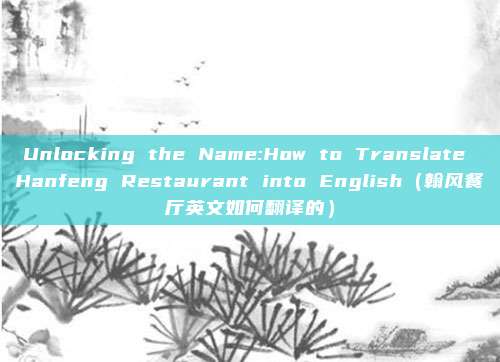Unlocking the Name:How to Translate Hanfeng Restaurant into English(翰风餐厅英文如何翻译的)
In the bustling world of international cuisine, restaurant names often carry a rich cultural significance that can be challenging to translate accurately. One such establishment that has captured the attention of both locals and tourists alike is 'Hanfeng Restaurant'. This article delves into the intricacies of translating 'Hanfeng Restaurant' into English, ensuring that the essence of the name is preserved.
The Significance of 'Hanfeng'
The name 'Hanfeng' is a compound of two Chinese characters, each carrying its own meaning. 'Han' (汉) typically refers to the Han Dynasty, a period in Chinese history known for its cultural prosperity and influence. 'Feng' (风), on the other hand, can mean 'wind' or 'style', suggesting a certain elegance or fashionability.
Direct Translation vs. Cultural Interpretation

When translating 'Hanfeng Restaurant' into English, there are two primary approaches: a direct translation and a cultural interpretation.
-
Direct Translation: A straightforward translation might simply be "Han Wind Restaurant." This method retains the original characters but may not resonate with English-speaking audiences who might not immediately understand the cultural context.
-
Cultural Interpretation: A more creative approach would be to interpret the name's essence. For instance, "Han Dynasty Elegance" or "Ancient Style Breeze" could capture the historical and artistic connotations of the name.
Popular Translations and Their Implications
Several translations have gained popularity among English-speaking customers. Here are a few examples:
-
Han Dynasty Restaurant: This translation directly ties the restaurant to the Han Dynasty, emphasizing its historical roots and potentially attracting customers interested in traditional Chinese culture.
-
Han Style Cuisine: This option focuses on the culinary aspect, suggesting that the restaurant offers a variety of dishes inspired by the Han Dynasty.
-
Breeze of Han: This translation is poetic and evocative, using the concept of 'wind' to imply a light, refreshing dining experience.
SEO Optimization and Online Presence
For those managing the online presence of 'Hanfeng Restaurant', it's crucial to consider SEO (Search Engine Optimization) when choosing an English translation. Using relevant keywords can help the restaurant appear in search results for potential customers. For example, "Han Dynasty Restaurant" might be a more effective SEO choice than "Han Wind Restaurant" if the primary focus is on historical dining experiences.
Industry Insights and Customer Preferences
According to a report by the Global Restaurant Marketing Group, cultural relevance and brand identity are key factors in attracting and retaining customers. A well-chosen English translation of 'Hanfeng Restaurant' can significantly enhance the brand's image and appeal to a wider audience.
Conclusion
Translating 'Hanfeng Restaurant' into English requires a careful balance between maintaining the original cultural significance and making the name resonate with English-speaking customers. Whether opting for a direct translation or a cultural interpretation, the goal should be to enhance the restaurant's brand identity and attract a diverse clientele. By considering SEO strategies and staying attuned to customer preferences, 'Hanfeng Restaurant' can successfully bridge the gap between Chinese heritage and global culinary experiences.
网站文章、图片来源于网络,以不营利的目的分享经验知识,版权归原作者所有。如有侵权请联系删除!





还没有评论,来说两句吧...